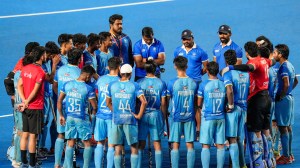Dream farewells can’t be scripted in boardrooms
So, either there is a VRS scheme or its equivalent in Indian cricket or there isn’t. Either way, somebody is looking stupid.

So, either there is a VRS scheme or its equivalent in Indian cricket or there isn’t. Either way, somebody is looking stupid.
If indeed there is one, it is time to mourn for it undermines a cricketer’s ambition and a selector’s prerogative. A cricketer has a right to play on till such time as he thinks he is fit and able and a selector has a right to determine whether that intent makes him worthy of a place in the team. You cannot barter a deal. That is for lesser pursuits in life; like being a member of Parliament before a no-confidence motion!
If, as in the current situation, you have players who have done very well for a long time and a call has to be taken on their future, the selectors first make up their mind and then have a dignified conversation with the player concerned. The non-negotiable here is the selector’s decision. You cannot sign a deal with a player for four games, for example, and keep him in the side if he doesn’t score a run in the first three and drop him if he makes a double hundred in the fourth.
Ideally that conversation should happen before a player’s value has eroded but when the end is in sight. It should be a little nudge that says a push is round the corner. It then allows the player to either announce his retirement or take up the challenge and accept the push if the performance is not forthcoming. But for that to happen the selection committee has to be independent and their judgement non-negotiable. It is not impossible for it happens every day in places where merit is respected.
However, I fear that after a decent run, the selectors will struggle to explain some of their more recent actions. When we have a change in selectors, it is a touch unwise to use a broom and sweep everyone away because it is such a waste of knowledge acquired over a period of time. The old selection committee seemed to be working towards an end, which was to replace the ageing players in the squad. Accordingly a young man with promise, Rohit Sharma, was made the reserve player. But then, when his form slipped, he should have been in the Rest of India side to allow him to strengthen his case. Instead Mohammad Kaif was picked and that made him next in line. Remember Badrinath was picked after him. However, when the time comes to pick the national team, Badrinath jumps the queue. It is leaving a lot of people confused.
As it is with the Ganguly issue. Two days before this team was picked, Dilip Vengsarkar said that he wasn’t physically fit enough to play at this level. Two days later, he presumably is. So, who is wrong? And therefore I have no clue about what the current policy with phasing out seniors is. The return of Ganguly is an admission of the fact that no youngster is knocking on the door loud enough to force the selectors to open it. Each of India’s last six outstanding batsmen, Azharuddin, Tendulkar, Ganguly, Dravid, Laxman and Sehwag did. You could argue that youngsters haven’t been picked in the middle order for a long time now but you could, even more strongly, argue that they haven’t done enough. I’d love to hear a national selector speak candidly about this.
Let’s return then to where we began, to the VRS story. If there is no such scheme should it be flashed in the media? Indian cricket, or indeed anything to do with public life, will always spawn conspiracy theories. But a news channel, by its very nomenclature, tells the ‘news’. It doesn’t gossip, it cannot clothe conspiracy theories in holier garbs because once it does so it no longer has the moral right to claim to be the “news”. It worries me as well that more and more young men and women are getting obsessed with reporting what happens off the field rather than on it. And it doesn’t help that the BCCI leaks more than a sieve. But should journalists be part of the “leak”, should they be mere mouthpieces?
Bright young men and women should love watching and reporting sport, not get increasingly drawn into the shenanigans that take place off it. If this is what we are telling the new generation about sports journalism, we are letting ourselves down. We are not leaving our profession in a better state than when we joined it.
- 01
- 02
- 03
- 04
- 05































